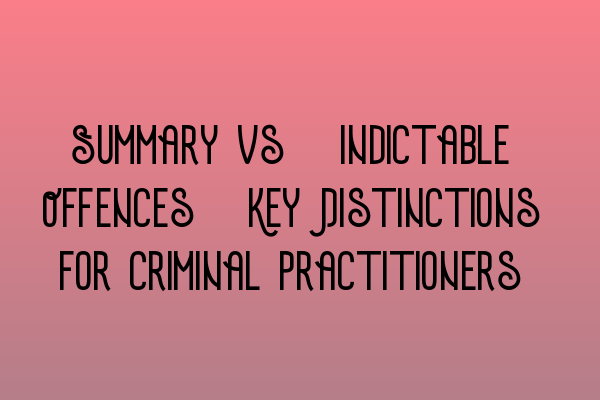Summary vs. Indictable Offences: Key Distinctions for Criminal Practitioners
As criminal practitioners, it is crucial to understand the key differences between summary offences and indictable offences. These distinctions impact how a case is filed, the severity of the penalties involved, and the procedures followed throughout the legal process. In this article, we will delve into summary and indictable offences, highlighting the essential aspects that every criminal law practitioner should be familiar with.
Summary Offences
A summary offence, also known as a minor offence, is a less serious criminal offence that is typically heard and decided in a Magistrates’ Court. These offences are less complex and carry relatively lighter penalties compared to indictable offences. Common examples of summary offences include minor theft, public disorder, and traffic violations.
When dealing with a summary offence, it is important to note that the maximum penalty that can be imposed is limited. In England and Wales, the maximum sentence for a single summary offence is typically six months imprisonment or a fine, or both. However, certain summary offences may carry different maximum penalties depending on the legislation governing them.
It is worth mentioning that summary offences are usually heard by a single magistrate or a panel of magistrates without a jury. This streamlined process allows for a quicker resolution and reduces the burden on the court system.
If you are preparing for SQE 1, it is essential to familiarize yourself with various types of offences, including summary offences. Enhance your knowledge and test your understanding with SQE 1 practice exam questions.
Indictable Offences
In contrast to summary offences, indictable offences are more serious criminal offences. These offences are typically tried in the Crown Court and are subject to more complex legal procedures. Indictable offences include crimes such as murder, rape, robbery, and serious fraud.
Indictable offences carry heavier penalties compared to summary offences. The sentences for indictable offences can vary widely depending on the specific offence and the circumstances of the case. In some cases, the penalty can be life imprisonment.
One key feature of indictable offences is the right to a trial by jury. The jury holds the responsibility of determining the guilt or innocence of the accused. The presence of a jury makes the trial process more elaborate and time-consuming compared to summary offences.
If you are aspiring to become a criminal law practitioner, it is crucial to gain a comprehensive understanding of indictable offences. Prepare yourself for SQE 2 by enrolling in SQE 2 preparation courses to enhance your knowledge and skills.
Hybrid Offences
It is worth noting that some offences can fall into both summary and indictable categories, known as hybrid offences. The decision of whether a hybrid offence will be treated as a summary offence or an indictable offence depends on factors such as the seriousness of the case and the choice made by the prosecution. In such cases, the penalties can vary accordingly.
To prepare fully for your career as a criminal law practitioner, it is crucial to have a solid understanding of all types of offences, including hybrid offences. Enhance your knowledge and skills by enrolling in SQE 1 preparation courses.
Conclusion
Understanding the distinctions between summary and indictable offences is crucial for any criminal law practitioner. Being well-versed in these key differences enhances your ability to effectively navigate the legal system and provide the best possible representation for your clients.
Remember, summary offences are less serious, heard in the Magistrates’ Court, and carry relatively lighter penalties, while indictable offences are more serious, tried in the Crown Court, and have heavier penalties. Don’t forget about hybrid offences, which can fall into both categories.
If you are preparing for the SRA SQE exams, make sure to check the SRA SQE exam dates and avail yourself of preparation resources such as SQE 1 practice mocks FLK1 FLK2 to increase your chances of success.
Remember, the key to success in criminal law practice lies in continuous learning, preparation, and staying up-to-date with the latest legal developments.
